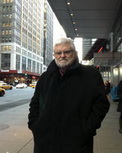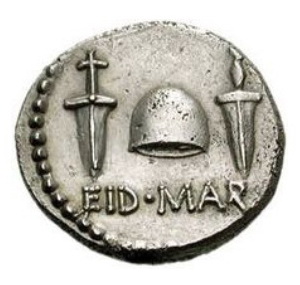 Chris
McDonnell, UK
Chris
McDonnell, UKchristymac733@gmail.com
 Chris
McDonnell, UK
Chris
McDonnell, UK
christymac733@gmail.com
Previous articles by Chris Comments welcome here
March 15, 2018
What's in a date?

Our
lives are littered with dates both personal and shared with the larger
community, dates that are significant markers on our journey. Our
liturgical calendar is framed round such dates, great feast days and
smaller remembrances. Easter, Christmas, Pentecost all
define points of faith, the developing story of the Christian people.
March
15 is a special date from the pre-Christian era. It was on March 15 in
44BCE that Julius Caesar was assassinated
in the Roman Senate. It gave rise to the words in Shakespeare's
play "Beware
the Ides of March". There was nothing special about the
date other than it being the middle of the month. The first of each month
was known as 'Kalends' and the 7th as 'Nones'. The warning given to Caesar by the soothsayer has become
associated with the Ides of March since Shakespeare's play of 1601.That
date in March became a turning point in the history of Rome as empire took
the place of republic.
Warnings
and premonitions litter our histories. They are often no more than made-up
stories to catch the imagination (and fear) of the age. Everyone waits for
the date to arrive and the prediction to be fulfilled and when the sun has
set and another day dawns, some semi-plausible reason is found to justify
continuity.
There
is a similar story in the Gospel of Luke in the conclusion of the Birth
narrative, when Jesus is being taken to the Temple on the occasion of the
purification of Mary. There the family are met by Simeon and Anna, in
their elder years and known for their presence about the Temple. Simeon's
arrival is recorded first by Luke and his words are of conclusion and
expectation. He
exclaims, “Now, Lord, you can let your servant depart in peace”.
He prophesies that the child in his arms is God’s salvation, “prepared
in the sight of all people, a light for revelation to the Gentiles and for
glory to your people Israel” the presence of the Saviour in
acknowledged and indication of his purpose is proclaimed. We marked that
event on February 2nd, the feast of Candlemas.
The
difference here though is that Simeon's words are fulfilled in the public
ministry of Jesus of Nazareth and the subsequent mission of the Church of
which we are a continuing part. Faith is not certainty given us on a
plate. It comes from a never-ending search and exploration, from being
alongside others, from reading and listening. We continually have to sift
through an accumulation of stories and events to focus on the reality
hidden in their depths. It is then that our response takes us on the way
and our lives are strengthened and changed.
There
are times, often brief, sometimes of a longer duration when there is a
darkness and numbness of heart, when old certainties seem lost and
obscured by a present reality and for a while the going is tough. All of
us have been there, including the great saints and prophets of previous
times and the present day, times when doubt and uncertainty pervade our
very being and it is hard to keep going. That is when trust is born and
those about us are there to be leaned on and their support sustains us.
For
some, that is hard for they see such dependence as weakness, feeling that
they should be 'able to cope'
when in fact the hand to hold, the shoulder to lean on, the reassuring
voice and the opportunity to listen are freely offered and should be
gratefully received. The phrase 'care
in the community' goes beyond the statutory services of medics,
district nurses and home care visits, there must be a community awareness
and response to need. There is a fine African phrase that tells us that 'the
village brings up the child'
Our
collective relationship is becoming lost in the selfishness of our Western
world. We need to remember each other and do what we can to help when the
need arises.
Visiting
a big hospital recently I was struck how the open space of Reception was
similar to the bustle of a main line rail station. I wrote this later that
day.
Another place
An open Concourse
walkers, some pushing
wheel chairs,
reminiscent of a rail
station
where they hurry for
trains.
Here the pace is
slowed
by circumstance.
Here the pain and
inconvenience of
illness
gathers for
appointments,
moving down long
corridors
to small waiting
rooms,
there to be greeted
and assessed.
A secure place for
listening
set aside for caring
compassionate
experience
hidden in the hollows
of open hands.
We
are indeed fortunate to live in a country where we care for each other and
although it is not perfect, the intention is true.
END
===